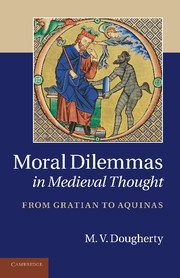Book contents
- Frontmatter
- Contents
- Preface
- Introduction
- 1 Gratian and his glossators on conflicts in the natural law
- 2 Twenty moral dilemmas from two early thirteenth-century summaries of theology: William of Auxerre's Summa aurea and the Franciscan Summa Halesiana
- 3 Raymond Lull and moral ensnarement in the Vita coaetanea
- 4 Thomas Aquinas, moral dilemmas, and a missing article from Quodlibet XII
- 5 Thomas Aquinas on failures of practical reasoning: Why synderesis doesn't inoculate agents against malformed conscience dilemmas
- 6 Moral dilemmas in the early Thomistic tradition: Johannes Capreolus and the Deceiving Demon Dilemma
- Conclusion
- Bibliography
- Index
6 - Moral dilemmas in the early Thomistic tradition: Johannes Capreolus and the Deceiving Demon Dilemma
Published online by Cambridge University Press: 03 May 2011
- Frontmatter
- Contents
- Preface
- Introduction
- 1 Gratian and his glossators on conflicts in the natural law
- 2 Twenty moral dilemmas from two early thirteenth-century summaries of theology: William of Auxerre's Summa aurea and the Franciscan Summa Halesiana
- 3 Raymond Lull and moral ensnarement in the Vita coaetanea
- 4 Thomas Aquinas, moral dilemmas, and a missing article from Quodlibet XII
- 5 Thomas Aquinas on failures of practical reasoning: Why synderesis doesn't inoculate agents against malformed conscience dilemmas
- 6 Moral dilemmas in the early Thomistic tradition: Johannes Capreolus and the Deceiving Demon Dilemma
- Conclusion
- Bibliography
- Index
Summary
A monument of the early history of Thomism is the wide-ranging Arguments Defending the Theology of St. Thomas Aquinas (Defensiones theologiae Divi Thomae Aquinatis) composed by the French Dominican Johannes Capreolus (1380–1444). Capreolus authored this massive work to defend the philosophical and theological system of Thomas Aquinas against a barrage of criticisms offered by many theorists in the century and a half after Aquinas's death. In the course of 190 quaestiones, Capreolus presented objections from Peter Auriol, Duns Scotus, and Henry of Ghent, among others, and then furnished replies ad mentem Thomae. He began the work in 1407 at the University of Paris at the request of his Dominican superiors, finally bringing it to completion two and a half decades later in Rodez in 1432, but it was not printed for another half-century. The Defensiones stands as the earliest comprehensive presentation of Thomistic philosophical and theological thought, and in light of his achievement Capreolus bears the honorific title Princeps Thomistarum or “Prince of Thomists.” In later decades Capreolus's masterwork became a sourcebook for Thomistic humanists of the Italian Renaissance as well as Catholic theologians of the Counter-Reformation. The Defensiones is strongly polemical; in it Capreolus defends the doctrines of Aquinas while attacking those who have criticized various points of the Thomistic system. The force and energy that pervade the work have led one commentator to characterize Capreolus as “a good representative of the Thomist school at war.”
- Type
- Chapter
- Information
- Moral Dilemmas in Medieval ThoughtFrom Gratian to Aquinas, pp. 168 - 197Publisher: Cambridge University PressPrint publication year: 2011



